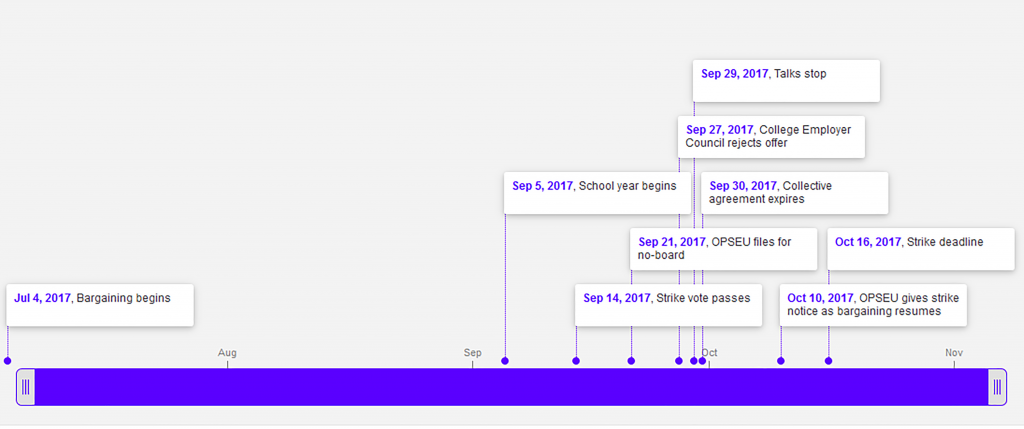The likelihood of a college faculty strike occurring seemed greater than ever as of Friday. But why?
OPSEU, the union that represents 12,000 college teachers across Ontario and at Algonquin, gave notice that it would go on strike if a deal is not reached by 12:01 a.m. on Monday, Oct. 16.
As of Friday, OPSEU and the College Employer Council, which represents colleges in bargaining, were not talking to each other as the strike deadline drew nearer.
There is much at play in this round of negotiations but the main sticking points can be condensed into these:
– Academic freedom and governance;
– Pay;
– Staffing levels and workload;
“At this present time it seems remote,” that students will return to classes on Monday, said Don Sinclair, CEO of the College Employer Council, on Friday morning.
The Council tabled its final offer on Tuesday. OPSEU rejected it and provided strike notice.
Similarly, OPSEU’s latest offer was tabled on Sept. 27 and also rejected by the Council. JP Hornick, chair of OPSEU’s bargaining team, said that was not their final offer.
“There will be more of those to come,” Hornick said. “We have a lot of hope that we can get an agreement (before Monday).”
Based on the last two offers from both sides, the Algonquin Times broke down some of the differences between the two sides.
When asked what the main sticking points are, Hornick and Sinclair had different answers.
For Sinclair of the Council, the sticking points are about money — full time ratios, reduced workload and salary increases, he said.
“No employer is going to bargain ratios and (staff) complement,” he said. “That’s a recipe for disaster.”
Establishing senates to make academic decisions is a big non-monetary issue that the Council has declined to discuss. It was not addressed in its final offer.
The senates, one of which already exists at Sheridan College, would be made up of student, faculty and administrative representatives. OPSEU says it would safeguard academic freedom, while the Council says it’s not a faculty issue.
Sinclair said it’s possible for an agreement to be reached before time runs out, but said it seemed unlikely. “We’re still $400 million apart (on monetary issues),” he said.
For Hornick, the issues are not about money.
“That’s really funny, because the key sticking points for us are no-cost items,” she said on Friday evening.
The main issues from OPSEU’s perspective are items such as academic senates.
“The key sticking issue is about sharing decision making,” she said. Those items have largely gone unaddressed by the Council.
Cost items, such as salary increases and a 50-50 ratio of full time to contract faculty, wouldn’t cost too much, she said.
“It’s a very funny thing that they want to focus on the costs when they have a $188 million surplus this year (for all colleges combined),” she said.
OPSEU’s proposed nine per cent salary increase over the course of the collective agreement is negotiable and there’s very little difference in terms of cost between that and the 7.75 per cent increase proposed by the Council, she said.
There were no more meetings scheduled as of Friday but both Hornick and Sinclair said they were open to more discussion over the weekend.
“There’s always a chance,” a last-minute deal can be reached, Hornick said.
To increase the sense of urgency for both sides, here is a convenient countdown to the strike deadline:


